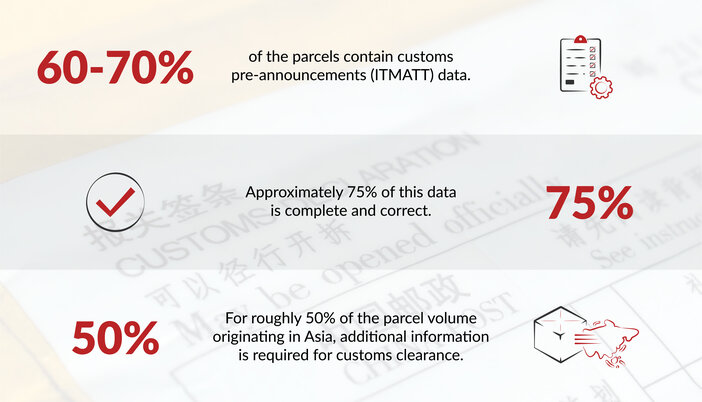On July 1, 2021, new regulations will come into force making all packages from outside Europe subject to VAT. This means that VAT will need to be calculated on all parcels entering Europe, and in practice will mean a 50-fold increase in the number of parcels for which the postal service must process VAT data.
Postal companies will need to submit ITeM ATTribute (ITMATT) data to customs for all Europe-bound parcels entering Europe as of July 1. If this additional flow of information has to be processed manually, it will result in a huge workload for postal companies, and potentially significant delays in parcel delivery.
Example business case
In cooperation with PostNL, we conducted an analysis on the flow of parcels from Asia. This revealed that 60-70% of the parcels contain ITMATT data, and approximately 75% of this data is complete and correct. In practice this means that for roughly 50% of the parcel volume originating
in Asia, additional information is required for customs clearance.
For PostNL, this would result in manual handling of tens of thousands of parcels. It will also be true for many other postal companies. Our customer asked us at Prime Vision for a solution to collect the ITMATT data because they do not have a sorting system at the international hub. So we developed the Manual Image Lift System (MILS), which provides the ability to collect high-quality images, that are processed by Optical Character Recognition (OCR) and a Video Coding System (VCS) to acquire the ITMATT data.
The clock is ticking
July 1 is coming faster than you think, and preparing your organization will take time. Delaying action to implement a solution will certainly lead to adverse consequences and additional workload. Our job at Prime Vision is to help postal companies prepare to process these wagon loads of parcels as quickly and efficiently as possible.
For parcels from countries such as the USA, Australia, New Zealand and the UK, we expect few problems and smooth processing. The challenge for postal companies lies primarily with the growing flow of parcels from Asia. Companies like Alibaba that work with many smaller suppliers face a challenge here. In addition, the quality of labels on parcels from Asia is often poor. This is where solutions such as the International Label Reader, OCR, VCS and the MILS come in handy. MILS was developed specifically for companies that do not have a sorting system in their international hub.
Time is running out, and delay in deploying solutions will certainly lead to problems and delays in importing packages from Asia.
This article was originally published in the April 2021 issue of Parcel and Postal Technology International.


